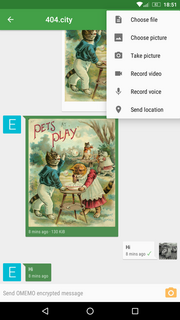Google Developers is Google's site for software development tools and platforms, application programming interfaces (APIs), and technical resources. The site contains documentation on using Google developer tools and APIs—including discussion groups and blogs for developers using Google's developer products.

Mono is a free and open-source .NET Framework-compatible software framework. Originally by Ximian, it was later acquired by Novell, and is now being led by Xamarin, a subsidiary of Microsoft and the .NET Foundation. Mono can be run on many software systems.
Google Authenticator is a software-based authenticator by Google that implements two-step verification services using the Time-based One-time Password Algorithm and HMAC-based One-time Password algorithm, for authenticating users of software applications.

OsmAnd is a map and navigation app for Android and iOS. It uses the OpenStreetMap (OSM) map database for its primary displays, but is an independent app not endorsed by the OpenStreetMap Foundation. It is available in both free and paid versions; the latter unlocks the download limit for offline maps and provides access to Wikipedia points of interest (POIs) and their descriptions from within the app. Map data can be stored on the device for offline use. Using the device's GPS capabilities, OsmAnd offers routing, with visual and voice guidance, for car, bike, and pedestrian. All of the main functionalities work both online and offline.

F-Droid is a software repository for Android, serving a similar function to the Google Play store. The main repository, hosted by the project, contains only free and open source apps. Applications can be browsed, downloaded and installed from the F-Droid website or client app without the need to register for an account. "Anti-Features" such as advertising, user tracking, or dependence on nonfree software are flagged in app descriptions.

AntennaPod is an free and open-source podcast aggregator app for the Android operating system.

Wear OS is a version of Google's Android operating system designed for smartwatches and other wearables. By pairing with mobile phones running Android version 6.0 or newer, or iOS version 10.0 or newer with limited support from Google's pairing application, Wear OS integrates Google Assistant technology and mobile notifications into a smartwatch form factor.

Android Runtime for Chrome (ARC) is a compatibility layer and sandboxing technology for running Android applications on desktop and laptop computers in an isolated environment. It allows applications to be safely run from a web browser, independent of user operating system, at near-native speeds.
Eddystone was a Bluetooth Low Energy beacon profile released by Google in July 2015. In December 2018 Google stopped delivering both Eddystone and Physical Web beacon notifications. The Apache 2.0-licensed, cross-platform, and versioned profile contained several frame types, including Eddystone-UID, Eddystone-URL, and Eddystone-TLM. Eddystone-URL was used by the Physical Web project, whereas Eddystone-UID was typically used by native apps on a user's device, including Google's first party apps such as Google Maps.
Universal Windows Platform (UWP) is a computing platform created by Microsoft and first introduced in Windows 10. The purpose of this platform is to help develop universal apps that run on Windows 10, Windows 10 Mobile, Windows 11, Xbox One, Xbox Series X/S and HoloLens without the need to be rewritten for each. It supports Windows app development using C++, C#, VB.NET, and XAML. The API is implemented in C++, and supported in C++, VB.NET, C#, F# and JavaScript. Designed as an extension to the Windows Runtime (WinRT) platform first introduced in Windows Server 2012 and Windows 8, UWP allows developers to create apps that will potentially run on multiple types of devices.

CopperheadOS is a mobile operating system for smartphones, based on the Android mobile platform. It adds privacy and security features to the official releases of the Android Open Source Project by Google. CopperheadOS is developed by Copperhead, a Canadian information security company. It is licensed under Creative Commons BY-NC-SA 4.0, although its source code is not available for public download.

Firefox Focus is a free and open-source privacy-focused mobile browser from Mozilla, available for Android and iOS smartphones and tablets. Firefox Focus was initially a tracker-blocking application for mobile iOS devices, released in December 2015. It was developed into a minimalistic web browser shortly afterwards. However, it can still work solely as a tracking-blocker in the background of the Safari browser on Apple devices.

AsteroidOS is an open source operating system designed for smartwatches. It is available as a firmware replacement for some Android Wear devices. The motto for the AsteroidOS project is "Hack your wrist."

LineageOS is an operating system for smartphones, tablet computers, and set-top boxes, based on Android with mostly free and open-source software. It is the successor to the custom ROM CyanogenMod, from which it was forked in December 2016 when Cyanogen Inc. announced it was discontinuing development and shut down the infrastructure behind the project. Since Cyanogen Inc. retained the rights to the Cyanogen name, the project rebranded its fork as LineageOS.

NewPipe is a free and open-source media player app for Android devices that is best known as an unofficial YouTube client. It is available in the F-Droid software repository, in NewPipe's F-Droid repository, or in the GitHub releases page. It can be used as an alternative to the official YouTube app.

MicroG is a free and open-source implementation of proprietary Google libraries that serves as a replacement for Google Play Services on the Android operating system. It is maintained by German developer Marvin Wißfeld. MicroG allows mobile device users to access Google mobile services with less tracking of their device activity compared to Google Play Services. In a presentation, Wißfeld described microG as "the framework to create a fully-compatible Android distribution without any proprietary Google components".

Conversations is a free software, instant messaging client application software for Android. It is largely based on recognized open standards such as the Extensible Messaging and Presence Protocol (XMPP) and Transport Layer Security (TLS).











